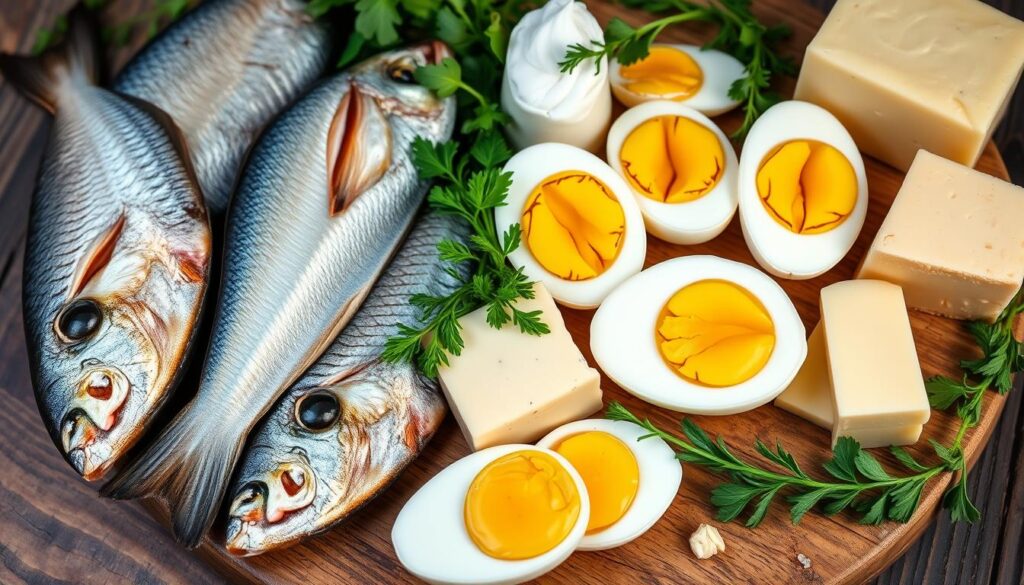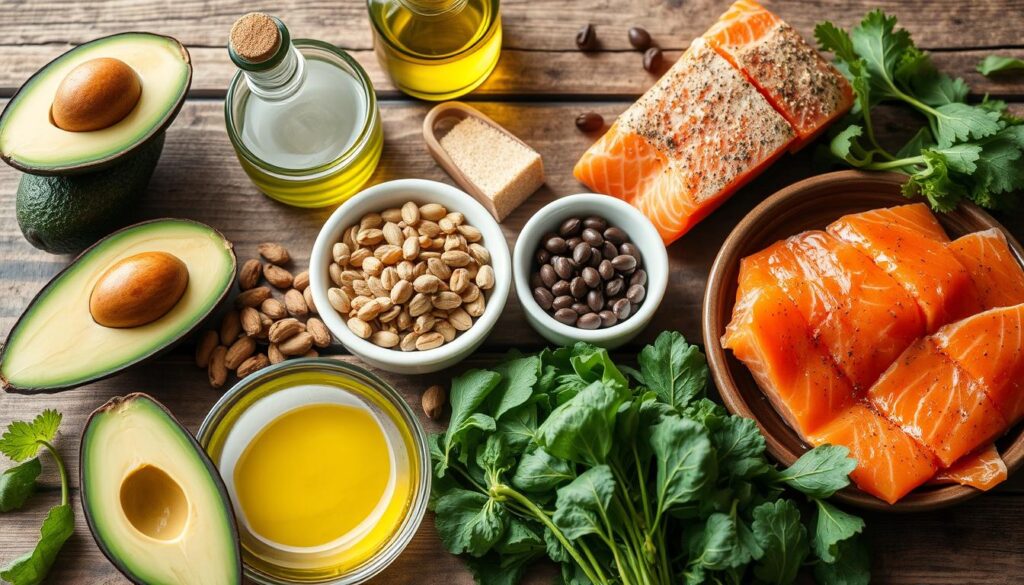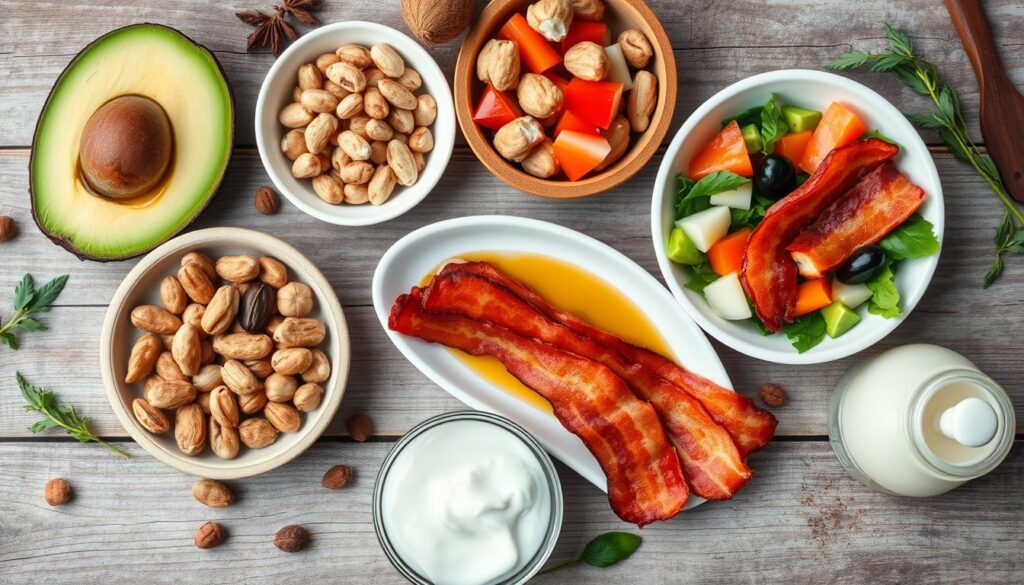If you’re starting the ketogenic diet, you might wonder about healthy fats. The keto diet focuses on eating lots of fat. You should get 55-60% of your daily calories from fat.
For a 2,000-calorie diet, that’s 122-133 grams of fat each day. But not all fats are good for you. Healthy fats from avocados, nuts, olive oil, and fatty fish are better. They can help your blood sugar, insulin, and blood pressure.
Key Takeaways
- The ketogenic diet requires 55-60% of daily calories from healthy fats.
- Unsaturated fats from avocados, nuts, olive oil, and fatty fish are better options.
- Healthy fats on keto can improve blood glucose, insulin sensitivity, and blood pressure.
- Proper planning and portion control of healthy fats are crucial for keto success.
- Balancing omega-3 and omega-6 fatty acids is important for overall health.
Understanding the Role of Fats in Ketogenic Nutrition
Fats play a big role in the ketogenic diet. Foods like avocados, nuts, seeds, olive oil, and fatty fish are key. They help your heart and fight inflammation, making them great for keto diets.
What Makes a Fat Healthy on Keto
Healthy fats are key on the keto diet. Look for monounsaturated fats in avocados and olive oil. Polyunsaturated fats are in nuts, seeds, and fatty fish. These fats help your heart and fight inflammation.
Daily Fat Requirements for Ketosis
The keto diet is mostly fat, with 60% of calories coming from it. You need 55-60% of your calories from fat to stay in ketosis. Getting the right amount of fat is important for health.
The Science Behind Fat Metabolism
When you’re in ketosis, your body uses fat for energy. This makes ketone bodies, which help fight inflammation. Knowing how fat metabolism works helps you get the most from your keto diet.
“The ketogenic diet may lead to the body entering a state of ketosis, where fat is used for energy production instead of carbohydrates.”
Essential Healthy Fat Keto Foods to Include Daily
Following a keto diet means adding healthy fats to your meals. This helps you stay in ketosis. There are many healthy fats that are good for you and help with your diet.
Here are some key healthy fats to eat every day:
- Avocados – They have healthy fats and are low in carbs. You can add them to many meals.
- Nuts and seeds – Almonds, walnuts, and chia seeds are full of good fats and fiber. They make you feel full.
- Olive oil – It’s good for your heart and can be used in cooking and dressings.
- Coconut oil – It has MCTs that help make ketones and support weight loss.
- Fatty fish – Salmon and tuna have omega-3s that are good for your health.
- Eggs – Eggs are full of protein and fats. They keep you full and give you energy.
- Full-fat dairy – Choose high-fat dairy like heavy cream and full-fat cheese.
Eating a variety of these fats helps you get all the nutrients you need. It also helps your body stay in ketosis.
“Healthy fats are the foundation of a well-formulated ketogenic diet. They provide sustained energy, support brain function, and promote feelings of fullness.”
Power-Packed Nuts and Seeds for Keto Success
Nuts and seeds are key for a healthy fat keto lifestyle. They give you keto-friendly fat and protein. They also have vitamins, minerals, and fiber for your low-carb diet.
Best Nuts for Ketogenic Diet
Try pecans, walnuts, almonds, macadamia nuts, and Brazil nuts on your keto diet. They have lots of healthy fat and not many carbs. For example, pecans have 196 calories, 20 grams of fat, and 1 gram of carbs.
Nutrient-Rich Seeds Selection
Don’t miss out on chia seeds, flax seeds, hemp hearts, and sesame seeds. They are full of omega-3s, fiber, and vitamins. Chia seeds have 138 calories, 9 grams of fat, and 2 grams of carbs.
Proper Storage and Portion Control
Keep nuts and seeds fresh in airtight containers. Store them in a cool, dry place. Eat a quarter cup of nuts or 1-2 tablespoons of seeds at a time. This helps you stay on your low-carb diet plan.
“Nuts and seeds are the foundation of a balanced healthy fat keto diet, providing satisfying fats, protein, and essential nutrients to fuel your body and mind.”
Plant-Based Healthy Fats: Avocados and Oils
Avocados and plant-based oils are great for a healthy keto diet. They are full of good fats. These foods help your body burn fat and are good for your health.
Avocados are amazing for keto diets. They are full of healthy fats and fiber. You can eat them in salads, as a spread, or just by themselves. They help your heart, balance blood sugar, and make nutrients easier to absorb.
Extra virgin olive oil is a top pick for keto diets. It’s full of antioxidants that fight inflammation. You can use it on veggies, for sautéing, or in dressings and marinades.
Other oils like avocado, sesame, and walnut are also good for keto diets. They have different tastes and health benefits. You can use them for cooking, baking, and making your keto dishes better.
| Oil | Smoke Point | Fatty Acid Profile | Culinary Uses |
|---|---|---|---|
| Avocado Oil | 520°F (271°C) | High in monounsaturated fats | Sautéing, roasting, dressings |
| Sesame Oil | 410°F (210°C) | High in polyunsaturated fats | Stir-frying, marinades, dips |
| Walnut Oil | 320°F (160°C) | High in omega-3 fatty acids | Salad dressings, light cooking |
Try these plant-based healthy fats to make your keto cooking better. They will help you stay healthy and happy.
The Benefits of MCTs and Coconut Products
Medium-chain triglycerides (MCTs) from coconut oil can change your keto diet game. They help you get into ketosis and might help you lose weight.
Types of MCT Oil
MCT oil comes from coconut oil or palm kernel oil. It has more MCTs than coconut oil. The main MCTs in MCT oil are:
- C8 (caprylic acid)
- C10 (capric acid)
- A mix of different MCTs
Incorporating Coconut Products
You can add coconut oil, milk, and flakes to your keto meals. Coconut oil is good for cooking because it can handle high heat.
Optimal Dosage Guidelines
Start with 1 teaspoon of MCT oil and slowly add more. Don’t take more than 4-7 tablespoons a day. Coconut oil can also raise good cholesterol, which is good for your heart.
While MCT oil and coconut oil are great for your keto diet, don’t rely only on them. Eat a variety of healthy fats and keto-friendly foods to reach your health goals.
Animal-Based Healthy Fats: Fish, Eggs, and Dairy
Following a keto diet means focusing on healthy fat keto sources. Fish, eggs, and full-fat dairy are great. They help with weight loss and health.
Fatty fish like salmon and tuna are full of omega-3s. These fats help your heart and reduce inflammation. They also have vitamin D for strong bones and a good immune system. Try to eat fish at least twice a week.
Whole eggs are a top keto-friendly fat source. They have vitamins, minerals, and protein. This keeps you full and happy.
Full-fat dairy like Greek yogurt, cheese, and heavy cream are good too. They add creaminess and flavor. They also have calcium and vitamin B12.
Choose organic, grass-fed, and pasture-raised animal fats. This means you get the best keto-friendly fat sources without additives or hormones.
Don’t forget to mix in plant-based fats like avocados, nuts, and seeds. This way, you get a variety of nutrients and healthy fats for your keto diet.

Smart Strategies for Cooking with Healthy Fats
Adding the right healthy fats to your keto diet is key. But how you cook and store them matters a lot. Let’s look at smart ways to use your keto-friendly fats.
Temperature Guidelines
Not all fats are the same when it comes to heat. Each fat has a smoke point, where it starts to break down. For frying, use oils like avocado oil because they have a high smoke point. For cooking that’s not so hot, like with olive oil, is better.
Best Cooking Methods
Choose cooking methods that use less heat to keep fats healthy. Baking, roasting, and sautéing are great. They let you enjoy the taste and health benefits of keto fats. But avoid grilling or frying too much, as it can harm the fats.
Storage Tips
Storing fats right is important to keep them fresh. Keep oils in a cool, dark spot away from heat and light. For animal fats like tallow or lard, use gentle cooking like steaming or boiling. This helps avoid harmful compounds.
By cooking and storing your healthy fat keto sources wisely, you’ll get more nutrition and taste in your keto meal plans and keto-friendly fat sources. Enjoy the tasty benefits of a well-made ketogenic diet!
Common Mistakes When Adding Fats to Keto Diet
Adding healthy fat keto is key for a good keto diet and low-carb diets. But, it’s easy to make mistakes with fats. Knowing what to avoid can help you get the most from your diet.
One mistake is eating too much saturated fat. This can hurt your cholesterol. It’s better to eat more monounsaturated and omega-3 fats from avocados, olive oil, and fish.
Another mistake is not watching how much you eat. It’s easy to eat too much of high-fat foods like nuts, seeds, and nut butters. Even though these fats are good, eating too much can make you gain weight.
Also, don’t eat too much processed meat like bacon and sausages. These foods have a lot of sodium and preservatives that aren’t good for you.

Be careful with “fat bombs” and other snacks that are very high in fat. They might seem like a quick way to get more fat, but they can cause you to eat too many calories. This can mess up your diet’s balance.
Instead, eat whole foods like avocados, olive oil, nuts, and seeds. This way, you can make your keto diet work better for you in the long run.
Balancing Omega-3 and Omega-6 Fatty Acids
Getting the right mix of omega-3 and omega-6 fatty acids is key for your health on a healthy fat keto diet. Omega-3s, found in fatty fish, flax, and chia seeds, fight inflammation. Omega-6s, in many vegetable oils, should be used less.
Experts say to aim for a 1:1 ratio of omega-6 to omega-3. This is better than the usual 16:1 ratio in Western diets. Adding various keto-friendly fats to your diet helps reach this balance. This unlocks many health benefits.
Having the right balance of omega-3 and omega-6 fats is good for your heart, brain, joints, and cells. Look into different healthy fat keto options. Find what works best for you.


A Life-Changing Experience with This Weight Loss Supplement (Nagano Tonic)
I’ve always struggled with finding a weight loss solution that actually works for me. Like many, I’ve tried numerous diets, exercise routines, and supplements over the years—some worked for a short time, but nothing ever gave me long-term results. That was until I decided to try the weight loss supplement I found : Link to the Supplement.
From the moment I started using it, I noticed a difference. Not only did I feel more energized, but my cravings also became more manageable. The best part? I started seeing results much quicker than I anticipated! Over the course of just a few weeks, I noticed a significant reduction in belly fat and overall weight loss that I hadn’t been able to achieve before.
What makes this supplement stand out from all the others I’ve tried is how it supports me in my daily routine without any jitters or energy crashes. I’m able to stay focused and motivated, which has made it easier to stay on track with my diet and exercise plan.
This product truly exceeded my expectations, and I feel more confident and healthier than ever before. If you’re struggling with your weight loss journey like I was, I highly recommend giving this supplement a try. It’s been a game-changer for me, and I’m sure it can work wonders for you too!
Contant Them on email .. tonicnagano50@gmail.com
I’ve tried so many weight loss products over the years, but nothing worked like this supplement! Since I started using it, I’ve noticed a big difference in my energy levels and appetite control. In just a few weeks, I’ve lost weight and feel so much better. It’s been easy to stick with, and the results speak for themselves. Highly recommend this to anyone looking to make a real change!
wasn’t sure what to expect, but this weight loss supplement has really impressed me! After just a few weeks of use, I’ve already dropped a few pounds and feel more motivated to stay active. It’s helped curb my cravings and boosted my energy throughout the day. I’m excited to keep going and see even better results. Definitely worth trying!
Reach them on tonicnagano50@gmail.com
I was skeptical at first, but this supplement has truly made a difference in my weight loss journey. I’ve lost weight without feeling deprived or sluggish. My cravings are under control, and I feel more confident in my body. It’s easy to incorporate into my daily routine, and the results speak for themselves. I’m so glad I gave it a try!
Thanks David, i do use the link to make my purchase. you can get too here http://surl.li/iasppy
I’ve tried so many weight loss products, but this one has been by far the most effective. In just a few weeks, I’ve noticed a visible difference in my body and energy levels. It’s helped me stay on track without the constant hunger pangs and cravings. I’m really happy with my progress and can’t wait to see where I’ll be in another month!
This Nagano Tonic has been amazing! In just a few weeks, I’ve lost weight, feel more energized, and my cravings are under control. Highly recommend it!
Thats the link to purchase http://surl.li/iasppy